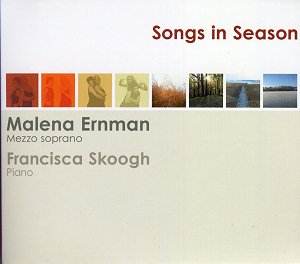I
was thrilled by Malena Ernmanís CD of cabaret songs on BIS, but
I did comment that I would have to suspend judgement on certain
matters till I had heard her in "straight" repertoire.
So here we are, and in spite of a few reservations I still think
sheís a super singer, quite the equal of several more touted mezzos
of the moment. She presents here a series of sixteen songs, four
for each season, encompassing a wide range of styles (though the
range of languages is not quite as great as it seems, since she
sings Grieg in her native Swedish and Tchaikovsky in German).
Each group ends with a piece written for this particular duo.
The programme may seem a little short for a CD but if, as I suspect,
this is a carefully planned recital programme the two artists
have been taking around, I applaud their decision to keep it as
it is.
Ernman
has a strong voice with a contralto-like richness, but capable
of an easy-sounding long high A in the Sibelius, and she has the
ability to sing with or without vibrato as required. She is completely
in control of what she does. But above all, she is a singer who
takes risks. The opening song simply bursts into life (from the
pianist, too), a far cry from the Mendelssohn beloved of Victorian
drawing-rooms, and all the better for it. Compare her in Mahler
with the excellent "normal" performance by Katarina
Karnéus and Roger Vignoles (EMI) and hear how Ernman (a
semitone higher) explodes with vitality. The downside of all this
commitment is that she can lapse into the breathy, eager-little-girl
manner favoured by Cecilia Bartoli, yet she shows, in the attractive
Respighi piece, that she can spin a long bel canto line (her operatic
roles include Rosina in Il Barbiere di Siviglia). Her Fauré
is also decidedly impressive, unexpectedly powerful at the beginning
to make the tender passages later all the more melting. The rare
pieces by Koechlin, Schreker and Liszt all make their point.
However,
she does sometimes go over the top. When commenting on Monica
Groopís performance of the Grieg I queried whether it might not
have been more legato. Ernman, at a tempo surely too fast for
the composerís Andante espressivo, is positively skittish, with
a surprisingly staccato delivery. Maybe if you understand the
language she is singing it has more point, but would not even
her compatriots rather hear the beautiful melody sung as lovingly
and tenderly as possible, as the great Aksel Schiøtz did?
The
Copland is attractively handled, but a couple of mispronunciations
have crept in. "Minutest" begins with "my",
not with the "mi" of "minute" in the sense
of a temporal unit, and "suffice" rhymes with "ice"
not with "bliss". There are no mistakes of this kind
in the Finzi but, oh dear, she and her accompanist think itís
an American cabaret song! Britishers used to the straight and
narrow will have their hackles raised, but, setting aside all
preconceptions, it is convincing in its own way, and foreigners
might find themselves enjoying a piece by the British pastoral
school at last.
Of
the songs specially written, the composers of the first two seem
to have been particularly struck by Ernmanís way with the cabaret
repertoire. Unfortunately, Staffan Stormís piece is little more
than an accompanied recitation of a lengthy prose piece by Strindberg
and its very limited musical interest is unlikely to appeal to
those who have no Swedish. Frankly, I got more pleasure out of
reading the text in English (all original texts and English translations
are provided) than out of listening to the song. The latter two
composers seem to have made a special study of the potentialities
of Ernmanís voice and, if Jennefelt is relatively conventional,
Catherina Backmanís piece is quite fascinating and deserves to
be taken up by those (perhaps not many) able to do it.
In
view of the real personality at work here, this finely recorded
recital is very much more than the sum of its parts. I look forward
eagerly to Malena Ernmanís next appearance on record Ė but I hope
that, next time round, she will sing Grieg and Tchaikovsky in
the original language.
Christopher
Howell
Footnote
We
have further information from Nytorp regarding the Grieg song:
There
exist two variations
of Norwegian, “old Norwegian” called Bokmål, and
“new Norwegian” called Nynorsk. Malena sings in “old
Norwegian”, and I think that the most common variation is
Nynorsk. They sound totally different, and Bokmål actually
sounds a lot like Swedish!

